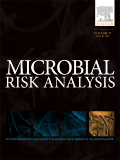
Microbial Risk Analysis
Scope & Guideline
Advancing Understanding of Microbial Threats
Introduction
Aims and Scopes
- Microbial Risk Assessment (MRA):
The journal publishes studies that employ quantitative microbial risk assessment (QMRA) methodologies to evaluate the risks associated with various pathogens in food and water systems. - Food Safety and Public Health:
Research articles often focus on food safety issues, including the risk of foodborne illnesses, providing insights into the impact of microbial contamination on public health. - Environmental Microbial Risk:
The journal encompasses studies on the risk of microbial exposure in the environment, including recreational water quality and the impact of climate change on microbial hazards. - Innovative Risk Management Strategies:
It highlights innovative approaches to managing microbial risks, including machine learning, predictive modeling, and surveillance techniques. - One Health Approach:
The journal emphasizes the interconnectedness of human, animal, and environmental health, often exploring microbial risks that span multiple sectors.
Trending and Emerging
- Climate Change and Microbial Risk:
Recent publications increasingly explore how climate change impacts microbial risks, emphasizing the need for adaptive risk management strategies in food and water safety. - Machine Learning and AI in Risk Assessment:
There is a growing trend towards using machine learning and artificial intelligence to enhance microbial risk assessments, showcasing the integration of technology in public health research. - One Health and Integrated Approaches:
The One Health perspective is gaining traction, with more studies examining the interconnections between human, animal, and environmental health concerning microbial risks. - Wastewater and Environmental Microbiology:
Emerging research focuses on the risks associated with wastewater treatment and its implications for public health, reflecting a heightened awareness of environmental contamination. - Predictive Microbiology:
The application of predictive microbiology is on the rise, as researchers seek to model microbial behavior and assess risks in various food production scenarios.
Declining or Waning
- Traditional Pathogen Studies:
There has been a noticeable decline in studies focusing solely on traditional pathogens, such as Salmonella and E. coli, with a shift towards more complex interactions and multi-pathogen assessments. - Static Risk Models:
The reliance on static risk models has decreased as researchers increasingly adopt dynamic and predictive modeling approaches that account for variability and changing conditions. - Foodborne Illness Epidemiology:
While still relevant, the frequency of publications dedicated solely to the epidemiology of foodborne illnesses has waned, as the focus shifts towards integrated risk assessments and management solutions. - Single-Pathogen Assessments:
Research focusing exclusively on single-pathogen risk assessments has become less common, giving way to multipathogen analyses that reflect the complex nature of microbial risks in food systems. - Historical Data Reviews:
The review of historical data and trends in microbial risks is appearing less frequently, as researchers prioritize real-time data analysis and predictive modeling.
Similar Journals
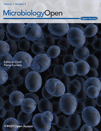
MicrobiologyOpen
Pioneering open access research in the world of microbiology.MicrobiologyOpen is a prestigious, open access journal published by WILEY, dedicated to advancing the field of microbiology. Since its inception in 2012, this journal has firmly established itself as a significant platform for researchers, professionals, and students alike, facilitating the dissemination of high-quality research findings across a wide range of microbiological disciplines. With an impressive impact factor and a ranking in the 76th percentile of Scopus for immunology and microbiology, MicrobiologyOpen offers a robust forum for innovative studies, reviews, and compelling insights that push the boundaries of scientific understanding. The journal's commitment to open access ensures that groundbreaking research is freely available to the global community, fostering collaboration and knowledge-sharing. As it continues to evolve until 2024, MicrobiologyOpen remains pivotal for anyone looking to stay at the forefront of microbiological research.
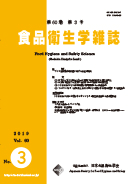
Food Hygiene and Safety Science
Cultivating a Safer Future through Food ScienceFood Hygiene and Safety Science is a pivotal academic journal published in Japan by the esteemed FOOD HYGIENE & SAFETY. With its ISSN 0015-6426, this journal operates within the broad domains of food science, public health, and medicine, strategically addressing the critical issues surrounding food hygiene and safety. With a notable history spanning from 1960 to 2024, it has become an essential resource in these fields, currently holding a Q3 category ranking in Food Science as well as in Medicine (Miscellaneous) and Public Health, Environmental and Occupational Health, according to the 2023 evaluations. Although access options may vary, the journal is committed to disseminating vital research findings to enhance food safety practices on a global scale. With its focus on advancing knowledge and sharing innovative practices, Food Hygiene and Safety Science serves as a vital platform for researchers, professionals, and students dedicated to improving food safety standards and public health outcomes.
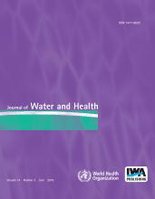
JOURNAL OF WATER AND HEALTH
Advancing global health through innovative water research.The JOURNAL OF WATER AND HEALTH, published by IWA PUBLISHING, serves as a leading platform for disseminating innovative research related to water quality, sanitation, and public health. With its ISSN 1477-8920 and E-ISSN 1996-7829, this esteemed journal significantly contributes to the fields of Public Health, Environmental Science, and Microbiology, as evidenced by its robust rankings in several quartiles, including Q2 in Public Health and Water Science and Technology in 2023. This periodical enjoys a convergence of years from 2003 to 2024, underscoring its continuous relevance in addressing critical global issues such as water safety and infectious diseases. Although not an open-access journal, the insights and findings presented are pivotal for researchers, professionals, and students eager to contribute to the sustainable management of water resources and health improvements worldwide.

mLife
Advancing microbial knowledge for a sustainable future.Welcome to mLife, an emerging journal at the forefront of microbiological research published by the esteemed WILEY in China. With its ISSN 2097-1699 and E-ISSN 2770-100X, mLife serves as a vital platform for scholars and practitioners aiming to advance their understanding of microbial sciences. With an impressive Q2 ranking in the Microbiology category and a Scopus rank of 143 out of 182, mLife is quickly establishing itself as a valuable source of cutting-edge research. The journal, covering a range of innovative topics from immunology to environmental microbiology, provides an engaging venue for disseminating high-quality research findings aimed at addressing real-world challenges. Authors and readers alike benefit from its accessibility features that encourage scholarly collaboration and information sharing. As we converge on the rich microbial landscapes from 2022 to 2024, mLife is committed to fostering a community dedicated to rigorous research and impactful discoveries.

One Health
Transforming Health Through Collaborative KnowledgeOne Health is a premier open-access journal published by Elsevier, dedicated to advancing the interconnected disciplines of Infectious Diseases and Public Health. Established in 2015, the journal aims to promote holistic approaches to health that consider the interactions between humans, animals, and the environment. With an impressive impact factor and recognition in the top quartiles of both Infectious Diseases and Public Health categories, One Health ranks highly within the Scopus database, showcasing its significant contribution to the field. Situated in the Netherlands, the journal encourages scholarly communication and collaboration, providing a vital platform for researchers, professionals, and students to disseminate their findings and strengthen global health initiatives. By utilizing the open access model, One Health ensures that critical research is freely available, fostering a broader understanding of health-related issues that span multiple sectors.

Microbiology Research
Exploring the Microbial Universe, One Study at a TimeMicrobiology Research, published by MDPI, stands as a pivotal open-access journal in the field of microbiology, having established its presence since 2010. Based in Switzerland, this journal strives to provide a platform for innovative research and cutting-edge findings in various branches of microbiology, including medical microbiology and molecular biology. With an impact factor that reflects its dedication to scholarly excellence, Microbiology Research is classified in the Q3 category for both microbiology and medical microbiology, and Q4 for molecular biology as of 2023, indicating its growing importance and outreach within these domains. The journal aims to foster discussion and collaboration among researchers, professionals, and students by presenting articles that cover a wide array of topics and methodologies in microbiological research. Leveraging its open-access model, Microbiology Research ensures that high-quality research is accessible to a global audience, thus facilitating the advancement of knowledge and innovation in the microbial sciences.
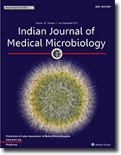
Indian Journal of Medical Microbiology
Connecting Global Scholars in Microbiology and Infectious DiseasesIndian Journal of Medical Microbiology, published by Elsevier, is a pivotal peer-reviewed journal dedicated to the field of medical microbiology, providing a vital platform for research and scholarship since its inception in 1986. With an Open Access model established in 2001, it ensures the dissemination of scientific knowledge to a global audience, enhancing accessibility for researchers, professionals, and students alike. The journal's scope spans critical areas including immunology, infectious diseases, and microbiology, with an impressive trajectory marked by converged years of publication allowing for a comprehensive exploration of evolving scientific trends. As of 2023, the journal holds a Q3 ranking in Infectious Diseases and Microbiology (medical) and a Q4 ranking in Immunology and Microbiology categories, reflecting its significant yet growing impact in the field. Researchers seeking to contribute to or stay updated on the latest advancements in medical microbiology will find the Indian Journal of Medical Microbiology a valuable resource, as it consistently bridges the gap between emerging science and clinical application.
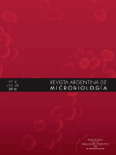
REVISTA ARGENTINA DE MICROBIOLOGIA
Advancing microbiological knowledge for a healthier tomorrow.REVISTA ARGENTINA DE MICROBIOLOGIA, published by the ASOCIACION ARGENTINA MICROBIOLOGIA, stands as a prominent open-access journal in the field of microbiology and medicine since its establishment in 1979. With an ISSN of 0325-7541 and an E-ISSN of 1851-7617, this journal has paved the way for disseminating high-quality research while enhancing accessibility for academics and practitioners worldwide. The journal has achieved notable rankings, being classified in Q3 for Medicine (miscellaneous) and Q3 for Medical Microbiology in 2023, reflecting its commitment to advancing knowledge in these critical areas. Despite its relatively modest impact factors, it occupies a vital niche in the academic landscape, fostering collaborations and innovative research among experts. With Open Access available since 2013, REVISTA ARGENTINA DE MICROBIOLOGIA not only facilitates widespread distribution of valuable scientific information but also empowers researchers, professionals, and students to stay abreast of the latest findings and developments in microbiology. For those engaged in the evolving realm of microbiology, this journal serves as an essential resource for sharing insights and advancing the scientific community.
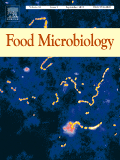
FOOD MICROBIOLOGY
Fostering knowledge that nourishes the food industry.FOOD MICROBIOLOGY is a premier journal, published by Academic Press Ltd - Elsevier Science Ltd, dedicated to advancing the field of food science and microbiology. With an impressive impact factor and recognition as a Q1 journal in Food Science and a Q2 journal in Microbiology, it holds a significant position in the scientific community, emphasizing research that explores microbial phenomena in food products. Established in 1984, the journal continues to thrive with converged coverage until 2025, making it an essential resource for researchers, professionals, and students aiming to deepen their understanding of food-related microbiological issues. While it operates under traditional access options, the journal is highly regarded for its rigorous peer-review process and impactful contributions to agricultural and biological sciences, ranking #26 in Food Science and #22 in Microbiology according to Scopus. Researchers are encouraged to submit their findings that impact food safety, quality, and preservation, fostering a collaborative environment that generates knowledge pivotal for the food industry and public health.

ARCHIVES OF MICROBIOLOGY
Bridging Disciplines, Inspiring DiscoveriesThe Archives of Microbiology, published by Springer, is a reputable journal in the field of microbiology, serving as a vital platform for the dissemination of groundbreaking research and critical reviews since its inception in 1974. With an ISSN of 0302-8933 and an E-ISSN of 1432-072X, this journal operates out of Germany and maintains a global reach, promoting high-quality scholarship across multiple disciplines, including biochemistry, genetics, and molecular biology, as evidenced by its Q2 ranking in Medicine (miscellaneous) and consistent Q3 placements in other categories in 2023. Although the journal does not offer open access options, its rigorous peer-review process ensures that published articles are of the highest standard, making it an essential resource for researchers, professionals, and students keen on advancing their understanding of microbial sciences. As the journal converges toward 2024, it remains committed to fostering innovative microbiological research and facilitating interdisciplinary dialogue within the scientific community.